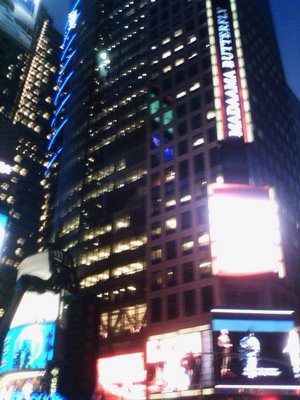Not that anyone was bad, least of all vocally. Olga Makarina is too light of voice to make much of Elettra's outer-act arias, but she hit all the notes and did a commendable "Idol mio" in between. Ben Heppner, who had his troubles at the end of last season, sang the title role well despite starting fairly constricted and never quite showing the vocal sheen that made him famous -- and, judging by crowd reaction, beloved. Everyone else sang unreservedly well, from newcomers Jeffrey Francis (a most elegant Arbace), Simon O'Neill, and (Met Council winner) Lisette Oropesa to the offstage Stephen Milling to yet-unmentioned lead Kristine Jepson. But beyond that...
Though Radames' "Celeste Aida" is the most famous cold start, Ilia's opening recitative and aria may be comparably tricky -- right from the curtain, she must convincingly rage and swoon while delivering huge chunks of exposition for the audience. Röschmann did well with these hurdles, but it wasn't until her early second- and third-act arias that she seemed to communicate Ilia's emotions moment by moment. (At her best, she's been about live currents of feeling borne on dark, quick-vibrato sound.)
But what dramatic energy was onstage was almost all Röschmann's. Jepson, whose energy and spontaneity I'd admired last as Siebel, wasn't able to reproduce that within the much more complex character of Idamante. So the compromise of a notes-but-no-bite Elettra, certainly acceptable in a part that almost always demands compromise, left a surprisingly low quotient of drama on stage. Perhaps each singer could have shown more (Heppner, actually, did well considering his natural limitations as an actor) with more from the others to work off of. But it is Röschmann -- and then the chorus -- from which the dramatic heat comes; the other leads seem simply to reflect it. (By the end, mind you, that was enough, though Elettra's exit didn't -- as it can -- crash through the entire notion of opera seria.)
Levine, too, seemed off the mark. Not that he erred, but no phrase surprised me with its life as almost every one in Cosi had. And surely the singers' lack of dramatic inspiration wasn't wholly their own.
I may be exaggerating the faults. It was a satisfying evening, as I said, particularly from the stand-and-sing perspective. But if you can only do one, wait for the next cast: not only Magdalena Kožená but time should improve the current mix. For a Röschmann fix before Thanksgiving, there's this.
On a different topic: I passed on seeing last night's dress rehearsal of Faust (and don't review rehearsals anyway), but after the then-overlooked end-of-last-season performances of Elisir (which, yes, I never got around to writing up either) I wouldn't be at all surprised to find Ruth Ann Swenson again on her best form in the Gounod. Silly production notwithstanding.






